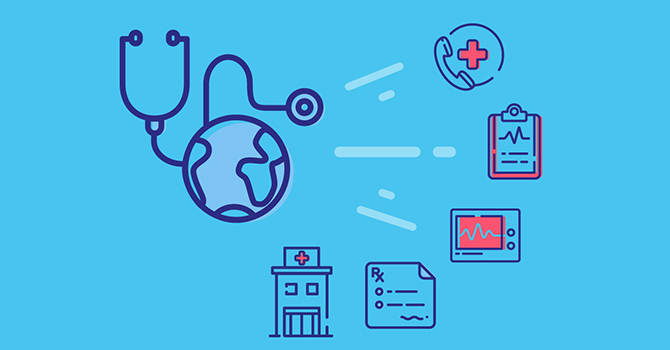Comprehending the Function of Medical Care RCM in Enhancing Economic Efficiency and Person Satisfaction
Browsing the details of Health care Income Cycle Administration (RCM) is vital for achieving optimum monetary performance while all at once boosting individual contentment. As we explore the transformative potential of RCM, inquiries regarding its critical application and future innovations beckon, encouraging insights that might redefine industry requirements and person experiences alike.

Key Components of RCM
In the complicated landscape of healthcare, Profits Cycle Management (RCM) is crucial in guaranteeing economic stability and functional effectiveness. Patient enrollment and qualification verification are fundamental steps, making sure that accurate individual information is caught and insurance policy coverage is verified prior to services are made.

Charge capture is an additional vital part, involving the precise recording of solutions offered to individuals. It ensures that all billable solutions are made up, thus taking full advantage of earnings potential. Concurrently, medical coding translates patient experiences into standardized codes, which are vital for payment and regulatory conformity.
Cases entry and monitoring follow, involving the preparation and submission of insurance claims to payers. This procedure calls for meticulous attention to detail to reduce errors and stop hold-ups. Rejection monitoring is a proactive approach to deal with and fix refuted cases, safeguarding revenue streams.
Lastly, payment uploading and patient collections finish the cycle, ensuring settlements are properly recorded and outstanding equilibriums are sought. With each other, these elements develop a robust framework that supports the financial and functional health of healthcare organizations.
Influence on Financial Efficiency
Effective Revenue Cycle Monitoring (RCM) significantly affects a medical care company's monetary performance by maximizing capital and reducing earnings leak. RCM includes the comprehensive payment and collection processes that ensure doctor successfully manage their financial deals from client enrollment to final payment. By simplifying these processes, companies can lessen denied cases, speed up settlement cycles, and enhance total monetary health.
Monetary performance is improved through careful management of payment procedures, which includes accurate coding and timely entry of claims. This lowers the probability of claim rejections and beings rejected, which can dramatically impede earnings flow otherwise addressed without delay. In addition, integrating sophisticated technology services promotes real-time tracking of insurance claims and monetary metrics, giving healthcare managers with the devices necessary to make informed calculated choices.

Enhancing Client Contentment
While enhancing monetary performance is an essential objective of Revenue Cycle Monitoring (RCM), it additionally plays a crucial duty in improving client complete satisfaction. By decreasing administrative burdens, RCM permits health care suppliers to focus much more on patient treatment, which directly improves patient contentment.

RCM likewise enhances individual contentment via effective interaction. By maintaining a detailed data source of patient info, RCM facilitates enhanced interaction in between clients and medical care service providers, making sure people feel notified and valued.
Approaches for Effective RCM
Accomplishing efficient Earnings Cycle Management (RCM) weblink needs medical care companies to implement a set of calculated techniques that ensure financial stability and operational effectiveness. One essential strategy is the adoption of technology-driven services, such as integrated software application systems that simplify billing processes, minimize mistakes, and boost information precision. These systems make it possible for real-time tracking of financial metrics, allowing for timely identification and rectification of ineffectiveness.
One more method is the standardization of procedures throughout the revenue cycle. Healthcare RCM. This includes establishing regular policies for patient registration, insurance verification, and declares processing. By making sure that all personnel abide by these requirements, organizations can minimize discrepancies and expedite settlement collections
Personnel training and advancement also play a pivotal duty in reliable RCM. Trained personnel can efficiently browse intricate invoicing procedures and regulations, improving and reducing rejections money flow. Normal updates on policy changes and ideal methods help maintain a educated and competent labor force.
Future Trends in RCM
As health care companies improve their Revenue Cycle Administration (RCM) strategies with modern technology and standardized processes, interest is now transforming towards the future fads shaping this important area. One substantial trend is the combination of expert i thought about this system (AI) and machine understanding to automate complicated jobs, such as insurance claims refining and anticipating analytics. These innovations are anticipated to lower errors, speed up deal times, and give data-driven insights for much better decision-making.
Furthermore, the change in the direction of value-based care continues to influence RCM methods - Healthcare RCM. Doctor are anticipated to significantly concentrate on patient outcomes and contentment, demanding RCM systems that can accommodate new reimbursement designs. This shift will need even more detailed information collection and evaluation to properly gauge and report on efficiency metrics
Interoperability is another arising top priority, as smooth information exchange in between inconsonant systems comes to be critical. Enhanced interoperability will certainly promote even more exact person details sharing, lowering management problems and enhancing the individual experience.
Final Thought
Medical Care Profits Cycle Administration (RCM) considerably affects both economic performance and person fulfillment by maximizing billing processes, making sure exact coding, and making it possible for timely claims entry. Reliable RCM lessens revenue leak and accelerates cash money circulation, minimizing case denials and accelerating repayments.
Browsing the intricacies of Medical care Revenue Cycle Monitoring (RCM) is necessary for accomplishing ideal monetary efficiency while simultaneously elevating individual contentment. RCM encompasses the comprehensive invoicing and collection procedures that ensure medical care companies successfully manage their financial purchases from individual enrollment to final settlement. By lowering administrative worries, RCM allows health care suppliers to focus more on patient treatment, which directly boosts person fulfillment.
By preserving an extensive database of client info, RCM helps with enhanced interaction between patients and health care carriers, ensuring clients feel educated and valued.Healthcare Earnings Cycle Management (RCM) significantly influences both economic performance and person satisfaction by enhancing payment processes, making sure exact coding, and allowing prompt cases submission.
Comments on “Healthcare RCM: Enhance Revenue Cycle Monitoring for Better Outcomes”